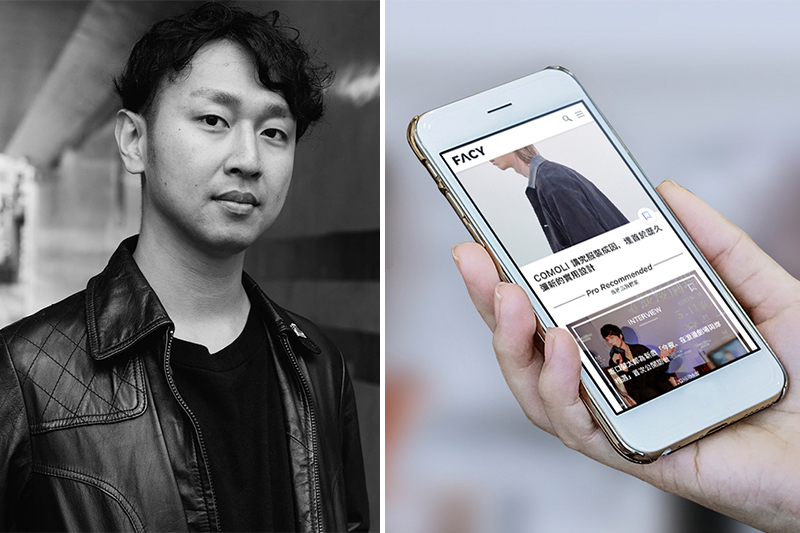Founded on the idea of bringing in-store services to digital shoppers, Japanese online marketplace FACY wants to help consumers find what they’re actually looking for and give shops a whole new customer base at the same time.
Created by ex-Amazon employee Tsubasa Koseki in 2015, FACY is an emerging online fashion marketplace attempting to upend the way we shop and sell. Billed as an Uber Eats for fashion businesses, the Tokyo-based startup provides a communicative online-to-offline (O2O) platform that connects those businesses with new customers searching for online products in return for a 20% fee from each item sold in a manner as straightforward as posting on Facebook or messaging on Whatsapp. Tsubasa sat down to tell us how FACY seeks to solve one of the biggest pain points in online apparel selling.

So, how does FACY work? Think of it as the Q&A site Quora but for fashion items. Users put up a post with questions or detailed descriptions of their fashion needs on FACY’s website or app – descriptions that can be as specific as ‘a pair of white sports sneakers to match with my daily office wear’, or as simple as ‘a dress to wear to a date’. The questions are then answered by staff in FACY members’ physical shops (of which there are more than 500), with suggestions, pictures and information sent through FACY’s in-app messaging function. Users can then either reserve and then try the product in store, or make a purchase directly through FACY’s online payment service.
Such a one-on-one, conversation-centric approach to e-commerce may sound unusual, but it’s what sets FACY apart. Since its inception three years ago, the program has already accumulated over 550k monthly active users and is currently providing its O2O support services to more than 500 fashion and apparel brands in Japan and Taiwan.
Accounting for the origin of FACY’s innovative shopping model, Tsubasa says the idea stemmed from a problem he observed during his days at Amazon. “It is one of the best e-commerce platforms, but it has been struggling in some markets, especially in the lifestyle product market,” Tsubasa reveals of his previous employer. “Like most e-commerce platforms, Amazon relies on customers’ keyword input to generate relevant results and product suggestions,” he explains. That means, after businesses upload their products onto the e-commerce platform, all they can do is wait passively for organic customers to discover them as they search. This may work for hardware product categories like gadgets and electronics, but when it comes to lifestyle categories such as apparel, where keywords may not be so easily defined, businesses cannot ensure their products will surface on the page, making them harder to find.

“Without a clear keyword, there can be a huge information gap between consumers and fashion shops,” Tsubasa says of the main issue he found in the online fashion space. As he saw it, fashion brands could only devise marketing strategies based on their own judgment, ie. what they thought customers would like to buy, rather than what the customer actually wants. “Traditionally, e-commerce platforms aim to provide the widest selection of goods with the cheapest price, through the most convenient shopping method. But this marketing model is designed to sell commodities, not to satisfy users’ needs,” Tsubasa states.
FACY is his solution. “With FACY, I want to pioneer a new future for retail marketing, where user experiences will be the pivot,” he says. Gone is the heavy reliance on the search engine, and instead businesses and consumers communicate via his interactive platform, (FACY, meaning ‘face-to-face,’) as it takes the one-on-one customer service from instore to online. User-centric by design, it provides shoppers with a shortcut to finding their ideal items online without having to go through the frustrating process of scrolling through tens – if not hundreds – of irrelevant garments that aren’t what they’re looking for.
FACY also offers its clients, the majority of which are middle price brands with less budget for online marketing, a digital space to set up their storefront, approach potential new online shoppers and eventually convert them into offline customers. And their high conversion rate has proven his user-centric O2O model to be effective. According to Tsubasa, his clients can generate as much as 22% of sales revenue from FACY, a performance that is ten times better than the results driven by social network service-based interactions.
Having recently secured USD 5 million in funding, Tsubasa plans to tap into the growing popularity of mobile shopping by launching a new payment function that allows users to get reward points and discounts by scanning items with the QR code scanner in FACY’s app. Eyeing up the vast opportunity brought by the booming e-commerce trend across the retail sector in Asia, FACY launched its first overseas market in Taiwan late last year as the start of an aggressive expansion plan. Speaking of his ultimate dream, Tsubasa envisions, “We’d like to expand our footprint across Asia and build a network of shops that truly understand what consumers want.”
x
Related Articles
7 Essential Sustainable Fashion Labels in APAC to Know
5 Entrepreneurial Tips to Get Your Fashion Business Started
Christina Dean: The Woman Leading a Global Movement in Fashion Sustainability





